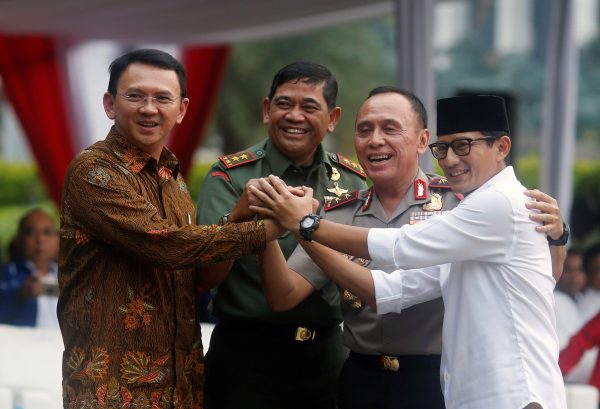The upcoming election for the governorship of Jakarta has forced observers to rethink assumptions about how far outside the mainstream intolerant views really are. In this week’s lead essay, Edward Aspinall outlines how the incumbent’s battle for re-election has exposed how ‘religious solidarity is trumping government performance’ in shifting votes.
Governor Basuki Tjahaja Purnama (known as Ahok) is a straight-talking ex-businessman who has won the admiration of many Jakartans for making progress on infrastructure development and cleaning up the city’s bureaucracy. He became governor when former governor Joko Widodo (known as Jokowi) was elected president in 2014; this will be his first attempt at gaining a personal electoral mandate in the capital.
Ahok is also Indonesia’s most prominent ethnic Chinese and Christian politician, and this ‘double minority’ status and his gaffes key to why he faces a real threat of being ousted on Wednesday. After his clumsy remarks about the Qur’an were spread on social media in late 2016, opponents seized upon Ahok’s alleged blasphemy to mount a ‘relentlessly negative’ campaign against him.
The governor’s popular support cratered in opinion polls, as hardline Islamic groups saw an opportunity to change the agenda, and their message has evidently spread far beyond their usual base and into mainstream voter groups. What’s more, during the campaign, ‘there has been a resurgence of racist denigration of ethnic Chinese of a sort not seen for years’, Aspinall observes.
This ugliness has crowded out debate about the city’s immense development challenges. Poor infrastructure, traffic congestion and chronic flooding seriously damage the quality of life in Jakarta. The economy suffers too. So acute are the effects of these externalities in Jakarta and other major cities that the World Bank says Indonesia is experiencing ‘diseconomies of scale’. The benefit to the country’s GDP growth from urbanisation is lower than in other developing economies in Asia.
Like many developing world megacities, Jakarta is often said to be a microcosm of the country at large. Perhaps more accurately, it’s a look into the nation’s future: the metropolis is typically more developed, more educated, more middle-class and more media-savvy than the national average. As such it is noteworthy that the surge of hostility towards Ahok, and the rejection on religious grounds of non-Muslim political leaders that has lain behind it, has been visible in a significant proportion of the urban middle class often assumed to be a constituency for political and social liberalism.
Also worrying, Aspinall says, is the possibility that ‘politicians may see this election as a toolkit that can be used in other contests — including the 2019 presidential race’. History suggests that presidential contests are won and lost on the administration’s economic performance, but attempts to disrupt President Joko Widodo’s re-election by playing up religious ‘wedge’ issues cannot be ruled out.
The fundamental strength of Indonesia’s pluralist tradition has endured periods of religious and ethnic polarisation, even conflict, in the past. Ahok may yet surprise observers by being re-elected. Whatever the outcome, Jakarta’s election will send a strong signal about the ability of Indonesia’s minorities to participate in politics as equals. The economic implications shouldn’t be underestimated either.
If politicians come to learn that their political fortunes rise and fall on their religious acceptability, rather than creating jobs and expanding public services, then that will have very real consequences for economic development too.

